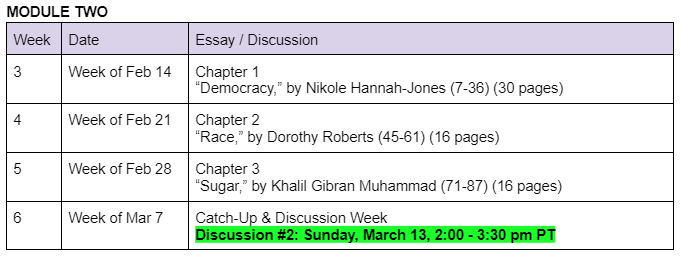1619: “Sugar,” by Khalil Gibran Muhammad
Week 5: “Even though cotton and tobacco dominated the colonial American economy, it was sugar that anchored the economy of the larger Atlantic world.”
Hi Book Clubbers! Hope you’re having a good week so far. Thank you for reading “Race,” sharing your learning in the comments, and reaching out to me privately. This is a good group we have!
Here we are in Week 5. It’s time to dive into this week’s reading. Here’s our schedule.
This week, let’s read “Sugar,” by Khalil Gibran Muhammad. It explains how the sugar industry created and formalized chattel slavery in colonial America and explores the lasting harmful legacy of “white gold” on Black Americans.
This week
Read “Sugar,” by Khalil Gibran Muhammad.
Recommended: In the comments, react to this passage: “One of the great ironies of sugar’s history in the United States is that the brutal work of the enslaved created an industry whose success in producing unhealthy food for mass consumption has taken its greatest toll on Black communities today” (74).
Also, please feel free to reach out. All you need to do is hit reply. If you’re interested in facilitating your small group conversation on Sunday, March 13, let me know. Thank you and have a great week!







I grew up in one of the food deserts that Gibran Muhammad describes in his chapter. When I think of the food closest to the house I grew up in, it was either high-fat fried food or high-sugar convenience food. That seemed normal. Grocery stores were scant and devoid of fresh vegetables. I think this chapter helps underscore how none of that is an accident. That not only did few BIPOC people run or profit from sugar businesses they toiled in but the unhealthy products made from sugar were advertised and sold to low income black neighborhoods with the fewest resources. It’s all the result of racist policies.
I was so very surprised at what I thought I knew about slavery in America,compared to horrible information I am learning as I read!!!!! Sugar crops never entered our curriculum when I was a child! It WAS always cotton and tobacco! What terrible damage the sugar crop DID afflict on all of our healths, but to the slaves and future black persons especially! What a sad, horrific chapter!